Hyperpigmentation is a common skin condition that can affect us all, especially as we get older. Apparent as patches of darkened skin, it's something you may feel self-conscious about, but fortunately, there is pigmentation cream available to buy to help improve its appearance. We spoke to the experts; Skin + Me Consultant Dermatologist, Dr Malvina Cunningham, and Award Winning Aesthetician and GP, Dr Ahmed El Muntasar. Using their knowledge, we've found the best pigmentation creams and serums to help fade those darkened areas and help your confidence glow.
Well, some of you may be wondering: what is hyperpigmentation? Dr Malvina says, "Hyperpigmentation is due to an increased amount of melanin produced within the skin that causes dark spots or patches to appear on the skin’s surface. It is a common problem and can be triggered by a number of underlying skin conditions."
Best pigmentation cream at a glance:
• Editor's Choice: OSKIA Renaissance Brightlight - view on Oskia Skincare
• Best for sensitive skin: La Roche-Posay Mela B3 Anti-Dark Spot Moisturiser SPF30 - view on Sephora
• Best for a range of pigmentation causes: SkinCeuticals Discoloration Defense Serum - view on SkinCeuticals
• Best budget pigmentation cream: Garnier 3.5% Vitamin C, Niacinamide, Salicylic Acid, Brightening and Anti Dark Spot Serum - view on Boots
According to Dr Ahmed, it can be both generalised (all over the body), or appear as localised pigmentation. "When it comes to localised pigmentation, this is the one that really affects people the most," says Dr Ahmed. "People think of skin cancer such as melanoma, it can be benign like Seborrheic keratosis, post-inflammatory such as after acne, eczema, or after certain medication."
There are three common hyperpigmentation causes: post-inflammatory hyperpigmentation, Solar Lentigo and Melasma. Luckily, there are creams with proven active ingredients, which are either available on prescription or over the counter. From the best treatment for melasma on the face in the UK to skincare budget buys, we've searched high and low for the best pigmentation creams and serums to help you glow.
Best pigmentation cream
Editor's Choice
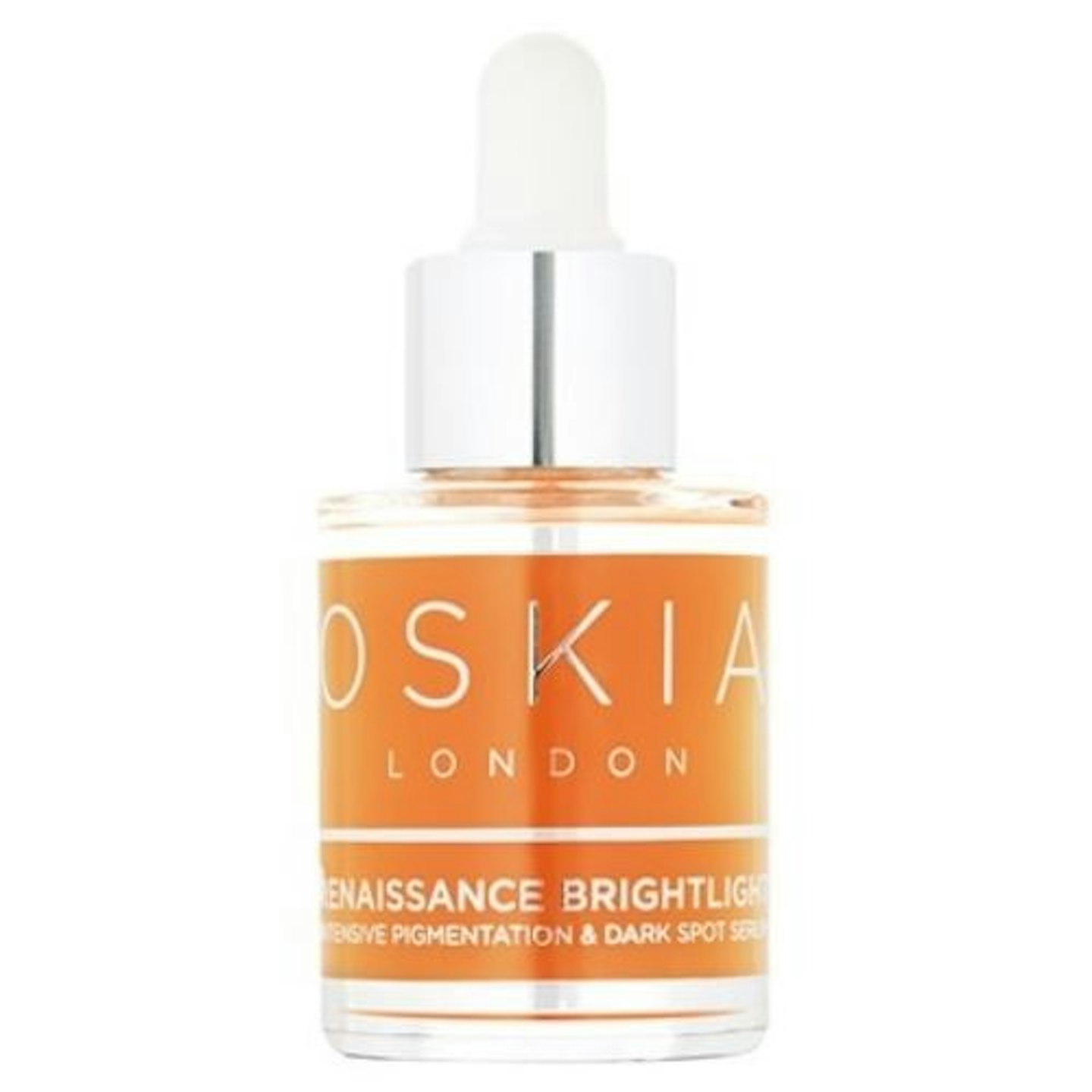
www.oskiaskincare.com
Award-winning and suitable for vegans, the OSKIA Renaissance Brightlight serum is an intensive daily treatment to help target hyperpigmentation. Containing a huge 13 brightening ingredients, including Vitamin C, fruit AHAs, Arbutin, and Niacinamide, it can increase your skin's radiance and even skin tone. It does this by slowing the process of melanin production and exfoliating away melanin that's already present on the skin. The formula is firm and gently scented with natural rose and chamomile for positively glowing results.
Thanks to plenty of customer reviews, the Oskia Renaissance Serum comes with a respectable 4.2/5 average star rating. 75% of reviewers would recommend this product, packed with star ingredients (Vitamin C, Niacinamide and Hyaluronic Acid, to name a few) to help your skin benefit from a much-needed boost. Widely praised for improving skin tone, reducing pesky dark spots and enhancing overall radiance, this pick is well-loved by reviews for its smooth texture and lightweight feel. You don't want something that feels heavy (!); though said to be sticky at first, it does sink in well. Reviews agree that results seem to come about when paired with a sun cream (which we should be using every day to protect our skin).
Though many customers love this luxury product - particularly the packing - a few users find it a little pricey for the size - and wish the results lasted longer. When it comes to skincare, consistency is key. However, this is said to be a great choice for tackling pigmentation and a brighter complexion.
Pros
- Beautiful texture and targets pigmentation
- Packed with proven ingredients
- Vegan, cruelty-free and free from any nasties!
Cons
- Some wish the results lasted longer - remember that consistency will garner longer-lasting results.
| Quantity | 30ml |
| Active Ingredients | Glutathione, Arbutin, Vitamin C, Sulforaphane, MSM, Niacinamide, Zinc Glycinate, Fermented Mineral Polypeptide Mix, Prebiotics & Hyaluronic Acid |
Best for daily dosage
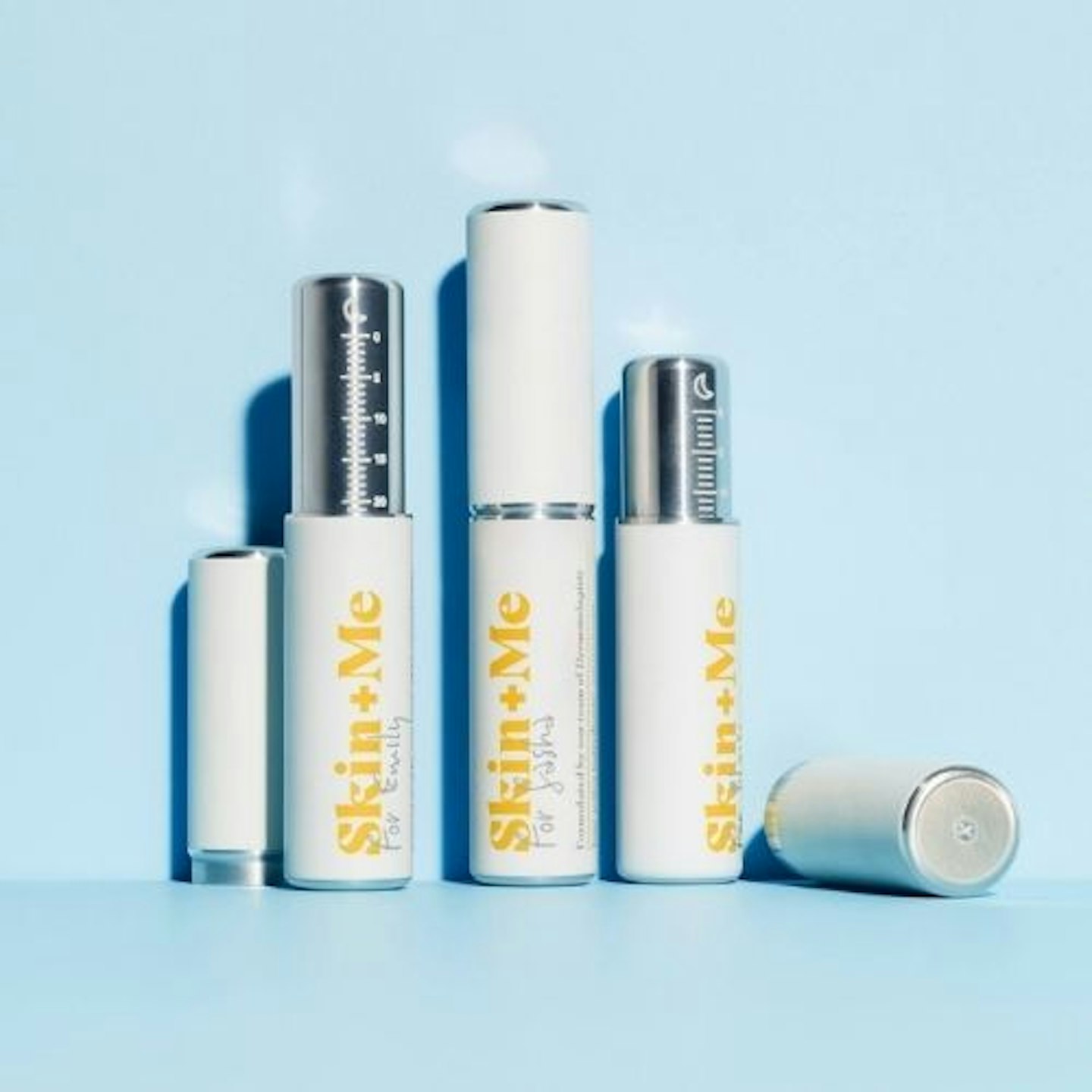
www.skinandme.com
This pigmentation repair cream from Skin + Me is full of antioxidants and moisture to care for your skin's barrier. With Azelaic Acid, the cream fights pigmentation caused by sun damage, melasma, and acne. If you're looking to prevent hyperpigmentation from scarring, the antioxidant will also help to fight inflammation, and redness, and soothe spots caused by acne and rosacea. And, it can help with melasma, too.
Skin + Me is the most unique pick on our list. Not so much for its ingredients - Azealic Acid and Niacinamide - are rudimentary when treating oily imbalances and rosacea - but it has a unique approach to skincare. With dermatologists on hand, a free consultation is available to help you find the right product for your skin type and problems. If people opt out of seeing the dermatologists and go straight to "buy", you're at risk of using the wrong product. After all, Azelaic Acid is a strong ingredient and causes reactions in some.
Many customers love the streamlined daily doser - said to deliver just the right amount of product and have seen visible improvements in skin texture (i.e. reduced blemishes and fading pigmentations) within weeks. When used with gentle, unscented cleansers and a high SPF consistently, results seem to appear most - from tackling acne to pigmentation to rosacea. Criticisms seem to be about the dropper - which some find ineffective, the higher cost and limited flexibility of the plans. But, Skin + Me does deliver on results.
Pros
- Contains evidence-based ingredients
- No monthly commitment
- Easy to apply, daily dose
Cons
- Some find the plans limited in flexibility and not good value
| Quantity | 12ml |
| Active Ingredients | Azelaic Acid |
Best for sensitive skin
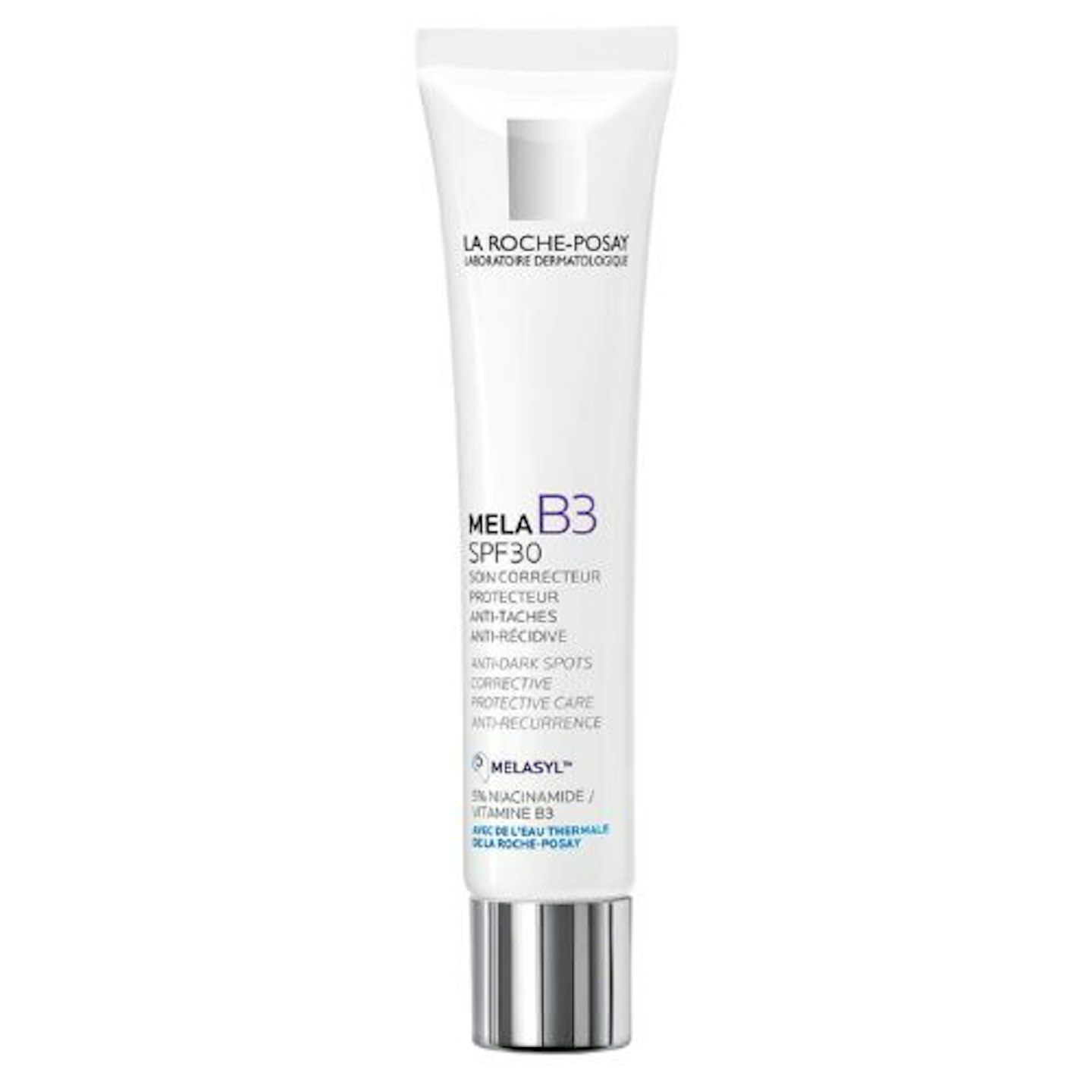 La Roche-Posay
La Roche-Posaywww.boots.com
La Roche-Posay is a fantastic brand with products specifically formulated for sensitive skin. So it's no surprise they have an excellent pigmentation cream in the La Roche-Posay Mela B3 Anti-Dark Spot Moisturiser SPF30. Having been through rigorous dermatological testing, La Roche-Posay ensures that this is the new corrective and protective care to "target hyperpigmentation and correct the look of dark spots", thanks to the ingredients. Yes - it's been formulated with Melasyl and Niacinamide which helps tackle tough spots. Available for daily use - even under make-up - this pick comes with a super-protective SPF 30 for further protection and TLC for your skin.
Since La Roche-Posay has changed the formula of its beloved "Pigmentclar", there are mixed reviews across the board. Yes - this newer formula with Melasyl is praised for its help with hyperpigmentation. Combination skin sufferers are super happy with the easy application and lightweight texture, causing little irritation. Some reviews reported fading melasma and noticed improvement in scars and dark spots.
However, with the replacement of the popular Pigmentclar, some customers are no longer happy with this pick. One customer said their skin became sore and dry after using and missed the old version. Others mention that they have concerns with possible allergens and SPF efficacy. Many agree that it's not best applied under a full face of make-up.
Pros
- Said to be good for those with sensitive skin
- Alcohol-free, hypoallergenic and won't block pores
- Contains SPF 30 for the everyday protection
Cons
- Many customers miss the old formula!
- Some agree that it's not best applied under make-up
| Quantity | 40ml |
| Active Ingredients | New Malasyl Active, Niacinamide. |
Best for a range of pigmentation causes
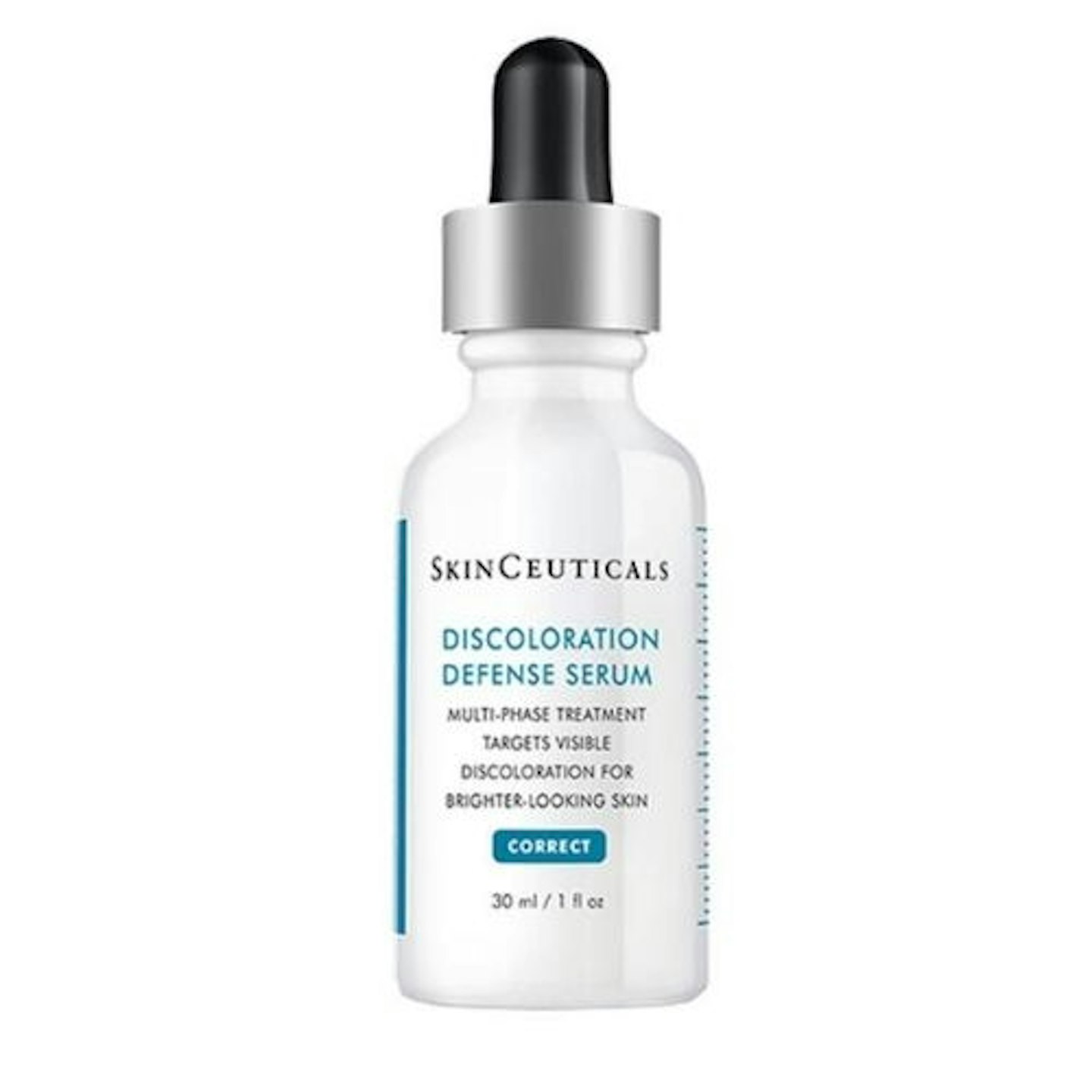
www.skinceuticals.co.uk
Suitable for all skin types, SkinCeuticals pigmentation serum has been proven to reduce the appearance of discolouration on the skin. Featuring a blend of anti-pigment and exfoliating ingredients, it can target a range of dark spots; those caused by hyperpigmentation, post-blemish scarring, and stubborn age spots. The active ingredient Tranexamic Acid helps to brighten dark spots and slow the production of melanin and Niacinamide helps to minimise uneven skin tone. Hydroxyethylpiperazine Ethane Sulfonic Acid provides exfoliation to remove dead skin cells.
The SkinCeuticals Defense Serum is well-liked, with an average star rating of 4.3/5 and 89% of customers recommend this product for helping with hyperpigmentation. As for positive feedback, a review says that after two weeks of consistent use, they've noticed a reduction in pigmentation from acne marks and sun damage. As such, the skin appears brighter and has a glow. Another has found that this works great with other SkinCeuticals products like Phloretin and SPF for treating melasma over time. Overall, it's said to be great for calming inflammation with irritation on sensitive skin. Most reviewers have combination skin types - and recommend supporting this serum with Vitamin C and SPF for the best results.
As for mixed feedback and negative, there are a few things to take into consideration if this is the right product for your skin. Some used this on their hands for sun damage - and had great improvements - but cannot say the same for the face. Our thoughts? Results will be seen after months of consistent use - so, don't expect immediate visible effects. A few reviewers noticed some breakouts in areas where the serum was applied. So, if you're super-prone to acne, we'd recommend trying this with caution. Results are said to diminish during days when you don't use SPF.
Pros
- High-potency formula
- Surprisingly light and gentle on the skin
- Non-sticky consistency
Cons
- Some found that the results took a long time and depended on pairing it with SPF
| Quantity | 30ml |
| Active Ingredients | PhE-Resorcinol, LHA, Niacinamide, Ferulic Acid |
Best for quick results
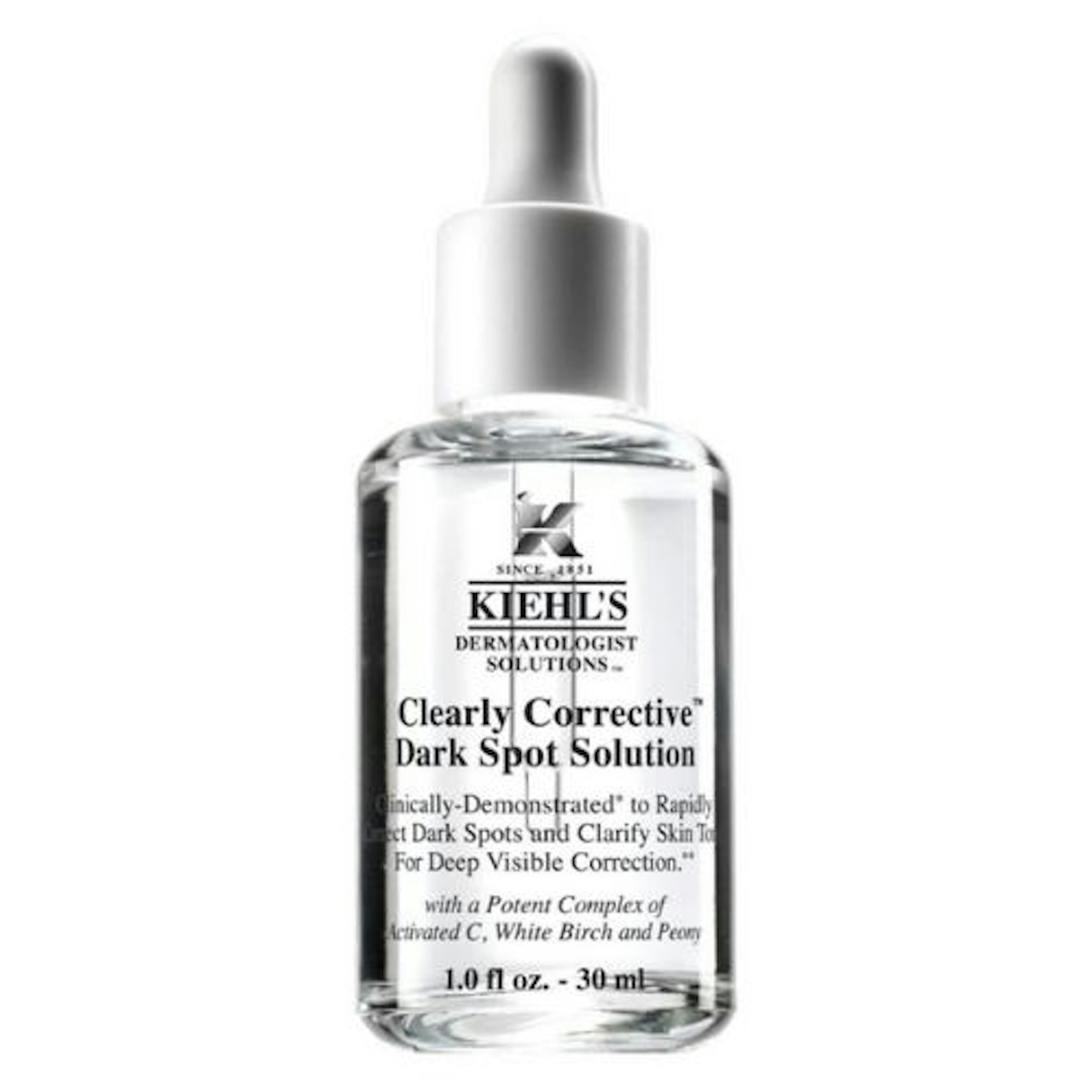
www.sephora.co.uk
With a potent, hydrating formula, Kiehl's dark spot solution visibly brightens the skin to help diminish the appearance of those dark spots and areas of pigmentation. Dermatologically tested for its gentleness on all skin types, the clinical test on 113 subjects over 12 weeks found double the reduction in dark spots. The Salicylic Acid helps to reduce blemishes and the Activated C specifically addresses uneven skin tone. It helps to make the skin more radiant and target hyperpigmentation, including Post-Inflammatory Hyperpigmentation (PIH) and Post-Inflammatory Erythema.
With an overall rating of 4/5 and a 74% recommendation rate, it's safe to say that Kiehl's Dark Spot Solution is a great choice for quick results. As a brand, Kiehl's is a mainstay in the skincare market; they're definitely on our list to try more of their fantastic range. We were pleased to see plenty of positive feedback on this Corrective Serum. Some observed improvement in dark spots within two weeks of consistent use - and some even noticed brighter and smoother skin after the first use. Lightweight, non-irritating and non-oily, many customers achieved glowing, even-toned skin after long periods of use; in some cases, dark spots faded completely and improved skin firmness greatly.
When it comes to mixed and negative feedback, some found that though their skin tone evened, dark spots remained. Very few reviews had problems with seeing results quickly, it'll vary from person to person, skin type to skin type. Others found it a little pricey. However, some customers had redness, irritations and breakouts despite the product being marketed as sensitive. Whereas, some reviews saw very few improvements or changes. Effectiveness will depend on your consistency, skin type and when you use the serum in your routine.
Pros
- Most reviewers saw quick and effective results
- Suitable for all skin types
- A little goes a long way
Cons
- Some found it stopped working as effectively after prolonged use
| Quantity | 30ml |
| Active Ingredients | Activated Vitamin C, Salicylic Acid, White Birch Extract. |
Best budget pigmentation cream
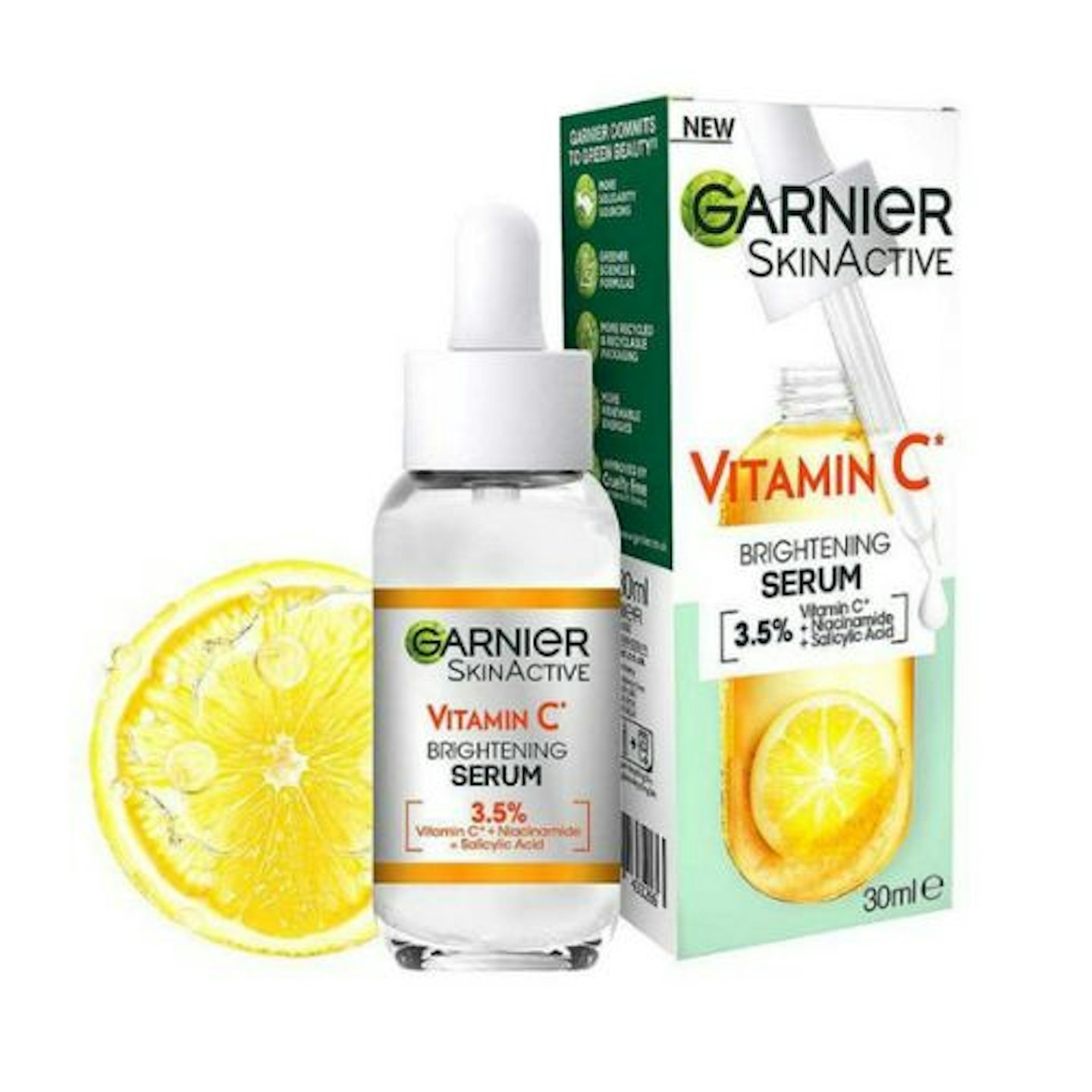
www.boots.com
Much like Kiehl's formula, Garnier's contains active ingredients Vitamin C, Niacinamide, and Salicylic Acid but for a fraction of the price. Suitable for all skin types and tones, the serum has promising benefits, such as helping to brighten and hydrate their skin and reduce the appearance of dark spots. The formula also comes enriched with Lemon Extract. This powerful superfood and antioxidant enhance the potent mix by helping to brighten your complexion. What are the reviews saying?
Based on over 800 reviews, this budget pick from Garnier is a standout, garnering an exceptional average of 4.5/5 and a 90% recommend rate. According to one user who noticed results within four to five weeks, it's the best product ever—"lightly scented, not sticky and effective." Another review claims that friends noticed a difference after just a week. Whether acne, scars, or sun spots, this serum is the go-to for an affordable glow and a sought-after even skin tone.
As for negatives, there are a few minor niggles from reviewers. Some found it caused a little irritation, redness, dryness, breakouts or a rash on their sensitive skin. So, make sure to check the ingredients before you buy. Some felt disappointed with the consistency between batches. One customer clarified: that their second bottle was a let-down because the formula had become thinner and "less effective".
Our tip: Use a SPF with this serum to maximise results and avoid sensitivity.
Pros
- Light and non-greasy formula
- Great value, vegan-friendly
- Nice scent, and good absorption
Cons
- Some felt disappointed with the consistency between batches
| Quantity | 30ml |
| Active Ingredients | Salicylic Acid, Niacinamide, Vitamin C derivative, Lemon Extract |
Best for all skin tones
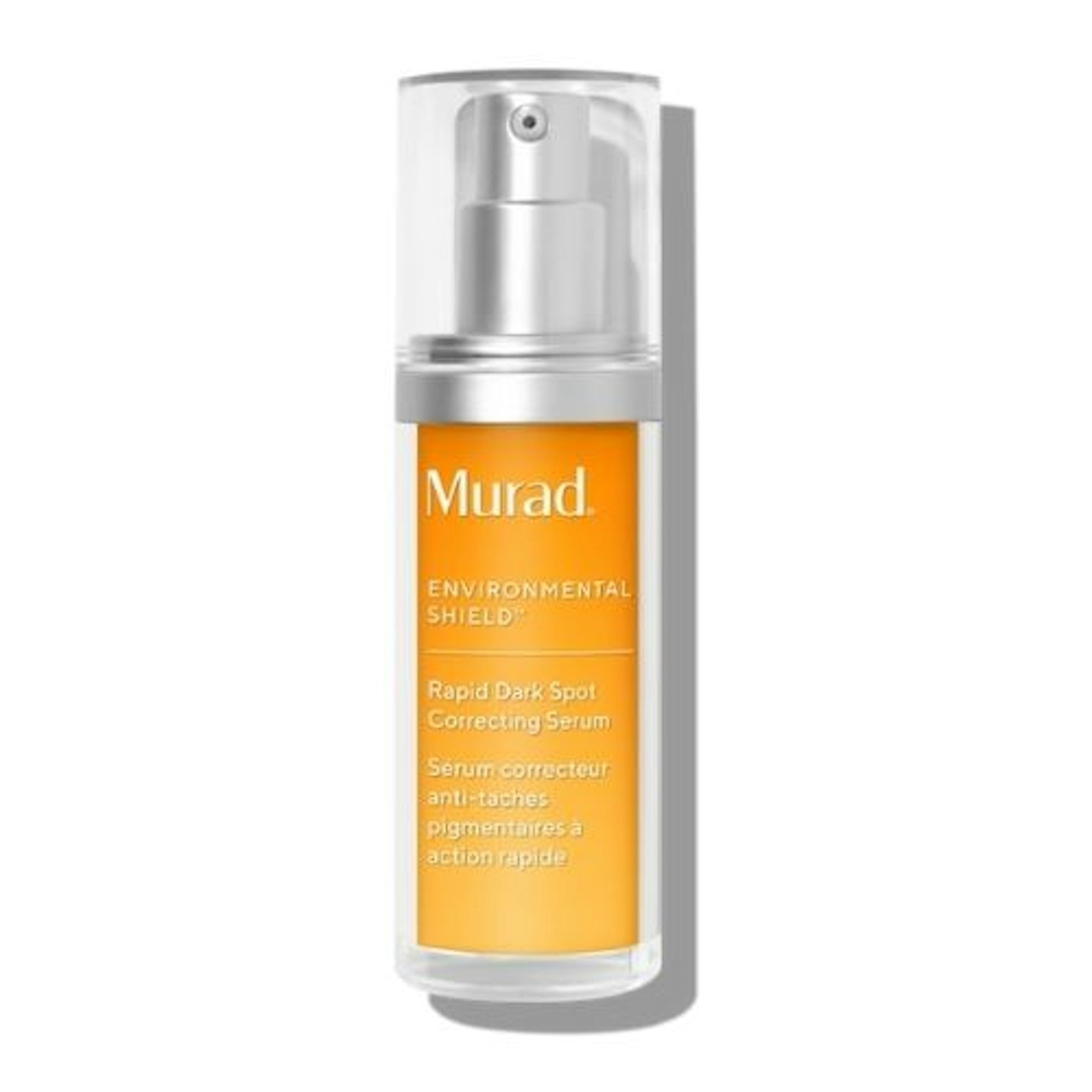
www.murad.co.uk
Not only does the Murad correcting serum help to treat the most stubborn dark spots, but it also uses antioxidant resorcinol that helps prevent the look of sun spots and discolouration for a more even skin tone in the future. Murad's patented resorcinol technology reduces the intense appearance of dark spots and promotes surface cell turnover for a brightened complexion. It claims that you can see rapidly reduced pigmentation in just 14 days on all skin tones.
With an amazing average rating of 4.7/5 stars, this Murad Serum is said to target spots, uneven tone, fine lines and sun damage, thanks to its patented formula - which contains glycolic acid for brightening. Free from parabens and sulfates, this pick ensures gentle use. One customer says they've used this since aged 10 - and is the only product that helps with skin texture. Another says it lightened dark spots within weeks (!) Many reviews are said to use it every day, consistently, absorbing quickly - for the brightest skin, which is radiant and even.
As for negatives or mixed reviews, some have experienced minor initial breakouts. Other reviews recommend pairing with a hydrating moisturiser for dryer and sensitive skin, to avoid any issues.
Pros
- Suitable for all skin types and tones
- Reviewers experienced quick and effective results
- Silky texture, great absorption
Cons
- Some suggested using in combination with a hydrating moisturiser for a better outcome in dry and/or sensitive skin
| Quantity | 10-30ml |
| Active Ingredients | Patented Resorcinol Technology, Tranexamic Acid, Glycolic Acid |
Best for future-proofing

www.facethefuture.co.uk
This gel from PCA Skin is a dermatologically tested corrective to fade the size and intensity of dark spots in as early as four weeks. Whether it's UV-induced or hormonally-induced hyperpigmentation, the formula uses their SynerPro Complex technology to inhibit melanin production and fade stubborn dark spots. Not to mention, it also helps to protect against the appearance of new dark spots, too. Apply on your face, neck, arms, or hands.
Based on user feedback, this PCA pick is the go-to for futureproofing, supporting hyperpigmentation and uneven skin tone. Non-sticky, quick absorption and great investment are some great keywords from reviews (blessing this product with a great 4.5/5 average rating). One customer says they've noticed an improvement in just a "few weeks of use", thanks to this super-gentle formula. Another agrees that after spending so much money on products, this pick gave them visible results in a short time. Consistent, daily use could help results appear super quickly. One review mixes this with a vitamin C serum which is a winning combination.
However, patience is required - clinical results are generally visible over 4-16 weeks - be persistent! There are a few mixed reviews - but, results will depend on individual skin concerns. And, there are a few reviews that mention that it's a very premium price.
Pros
- Suitable for all skin types and tones
- Can fade and prevent hyperpigmentation, light texture
- Results can become visible within a week or so
Cons
- Patience is required - results vary, but are generally visible over 4-16 weeks
| Quantity | 30ml |
| Active Ingredients | SynerPro Complex; Hexylresorcinol, Purified Licorice Root Extract, Tranexamic Acid, 4-Butylresorcinol. |
Best pigmentation sun cream
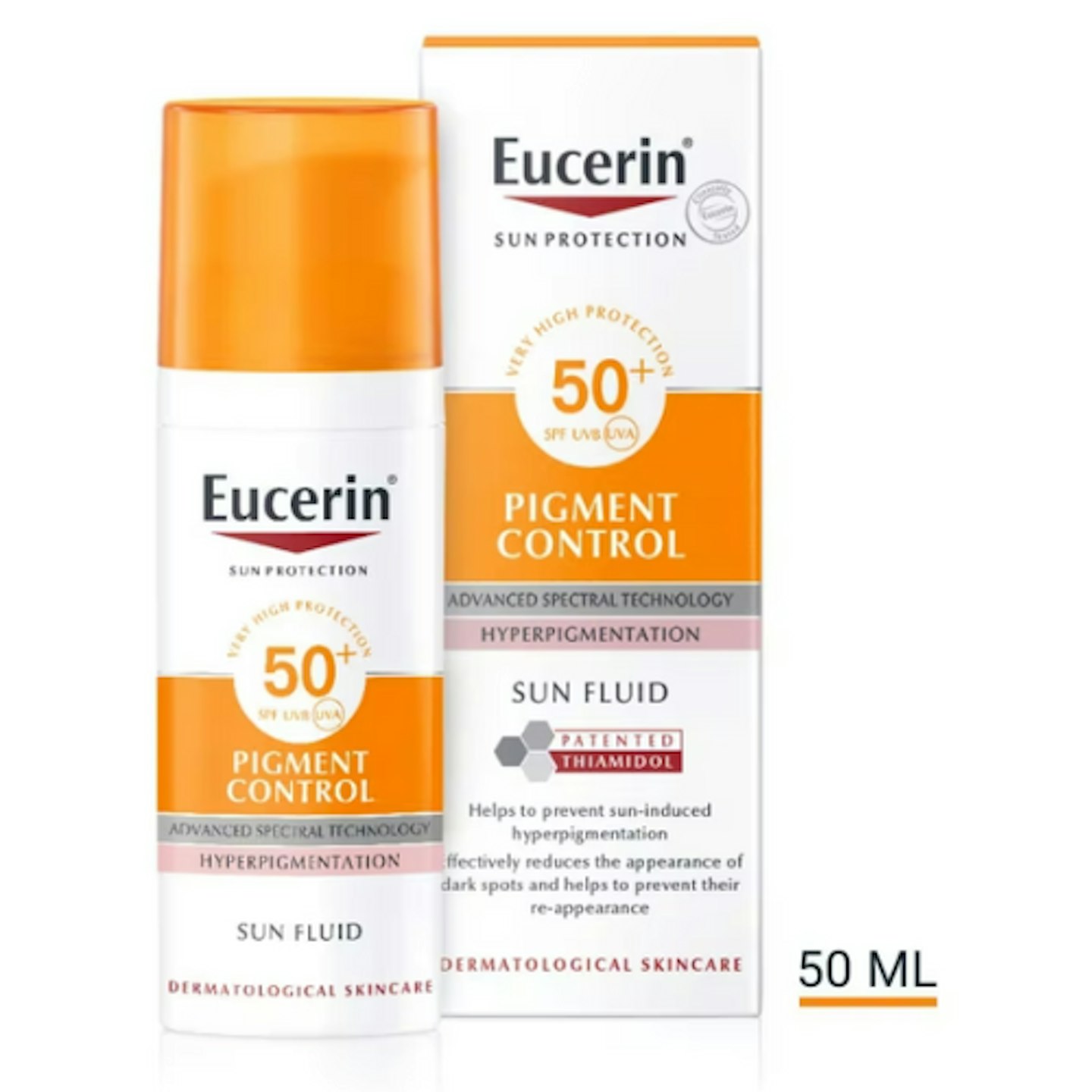
go.skimresources.com
Wearing a high SPF is recommended for preventing sunlight exposure from triggering more dark patches. The Eucerin Sun Fluid Pigment Control SPF50 is an everyday facial sunscreen for all skin types that's non-comedogenic and suitable for wearing under makeup. It uses UVA/UVB filters with Licochalcone A to neutralise free radicals caused by UV light, while Glycyrrhetinic Acid supports your skin's own DNA repair mechanism. Each of Eucerin's products includes Thiamidol, a patented ingredient that reduces melanin production to reduce hyperpigmentation.
Eucerin's Anti-Dark Spot Sun Cream is raved about online, with the Boots community awarding this pick a solid 4.6/5 average rating; 81% of reviews would recommend this pick which is a lovely number. Reliable enough for holidays and daily sun protection, this SPF is vouched by quite a few different reviews for its help in creating a natural glow. It's easy to apply, won't leave you feeling greasy and sits well under make-up. Besides all that, it won't clog any pores - so suitable for acne-prone skin - and is effective in tackling dark spots and hyperpigmentation, no matter the time of year. Lightweight, it blends seamlessly into the skin.
However, some customers with dry or eczema-prone skin report a little irritation. It does include fragrance which may not be suitable for sensitive skin. And, you may need to reapply throughout summer days.
Pros
- Contains SPF50+ to prevent re-appearance
- Smooth consistency, absorbs quickly
- Light texture for all skin types
Cons
- It does include fragrance which may not be suitable for sensitive skin
| Quantity | 50ml |
| Active Ingredients | Glycyrrhetinic Acid, Licochalcone A, Thiamidol |
Pigmentation FAQs
What causes uneven pigmentation?
There are three common hyperpigmentation causes:
Post-inflammatory hyperpigmentation (PIH)
"Post Inflammatory hyperpigmentation results from acne that heals to leave red to brown marks on the skin," says Dr Malvina. "Picking at spots and sun exposure will further worsen the inflammatory process and increase the risk of pigmentation. Post-inflammatory hyperpigmentation is much more common in darker skin types. Melasma presents as brown/greyish patches of mottled pigmentation that develop most commonly on the skin of females. The pigmentary changes are usually bilateral and often symmetrical."
Solar Lentigo
Also known as 'sun spots' or 'age spots', this pigmentation is caused by sun exposure.
"Solar lentigo (sun spots) appear as flat brown spots on the skin like enlarged freckles," shared Dr Malvina, "mostly found over sun-exposed areas such as the nose, cheeks, and temples but they can appear anywhere on the face as well as your chest and the back of the hands.
"While most sunspots are harmless they may occasionally change into precancerous or even cancerous lesions. If you notice a spot that stands out compared to others with an irregular shape, varied colours or changing size, go and see your GP to have it checked out."
Melasma
According to Dr Malvina, "The exact cause of melasma is as yet unknown, but we do know that hormones and ultraviolet (UV) light (from the sun's rays) play an important role."
Can I remove hyperpigmentation completely?
Dr Malvina says, "This varies from person to person and depends on the severity of pigmentation. Hyperpigmentation does tend to fade in the winter in most but active ingredients can further improve this process."
"I think of it like a chronic condition," says Dr Ahmed, "as you might not see signs of pigmentation but under the skin it might still be there. I think of it like someone with diabetes, for example. Your numbers might be under control but actually the second you start eating sweets, or something you shouldn't be. It's similar to pigmentation and being in the sun it will come back. So you might not see it on the outside but under the skin and in your body it's still there."
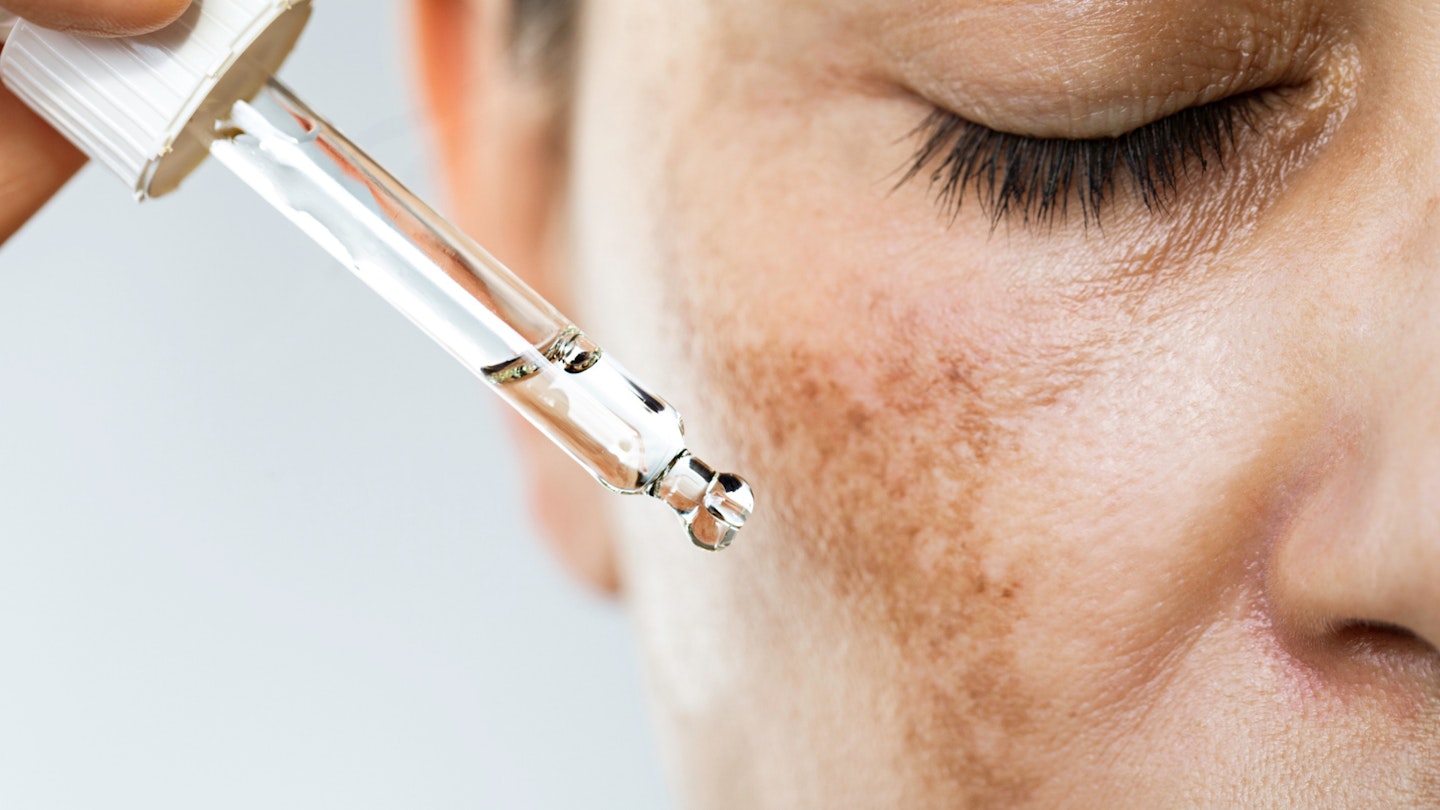
What to look for in the best pigmentation cream
"Look out for creams with proven active ingredients", says Dr Malvina. "Hydroquinone is a lightening agent that has the best evidence for treating hyperpigmentation. This is available on prescription as a combination cream with the vitamin A derivative tretinoin as well as a mild steroid called hydrocortisone."
In terms of ingredients in pigmentation creams available over the counter, Dr Malvina and Dr Ahmed recommend:
Azelaic acid
Kojic acid
Niacinamide
Resveratrol
Arbutin
Retinoids
When asked about the best vitamins for pigmentation, both recommended Vitamin C.
"There is insufficient evidence," says Dr Malvina, "but some suggest that Vitamin C supplementation particularly if low can be helpful but it is usually recommended in combination with topical treatments."
How to prevent hyperpigmentation?
"One of the most common causes of hyperpigmentation is UV exposure from the sun which you can prevent through sun avoidance, wearing protective clothing, and liberal use of broad-spectrum sunscreens," says Dr Malvina, something Dr Ahmend echoes.
He says, "The best prevention is using high-grade SPF, using SPF50 at least, and something that protects you from UVA, UVB and also thinking of things that can protect you from blue light. There isn't a lot of research to support that it can cause pigmentation but I think just logically we are in front of screens so much these days you wonder whether research later on in life will show it can actually cause pigmentation."
However, says Dr Malvina, "Hyperpigmentation caused by inflammatory conditions such as acne should be prevented by treating the condition itself."
Meet the experts:
This article contains expert advice from Dr Ahmed El Muntasar and Dr Malvina Cunningham. Dr Ahmed is an award-winning aesthetics doctor in the UK. He provides safe and advanced non-surgical treatments for both men and women, alongside personalised, patient-centred and expert care. Dr Malvina is a Skin + Me Consultant Dermatologist. Malvina graduated with honours from University College London, and was awarded a PhD in medicine. She trained in Dermatology at London’s leading teaching hospitals and now specialises in acne, skincare and medical dermatology for both the NHS and the private sector.
Eleanor Weaver is the Deputy Homes & Garden Product Editor for Yours, specialising in home décor, furnishings and appliances. Having worked commercially on Yours magazine and Yours.co.uk for the past six years, she's previously hosted Yours Live events and loves looking for home inspiration online.
